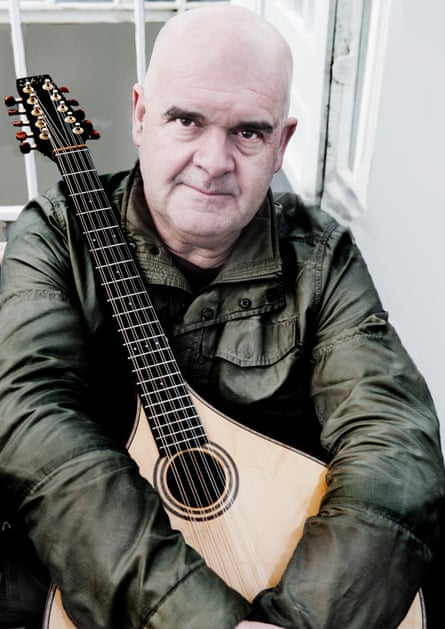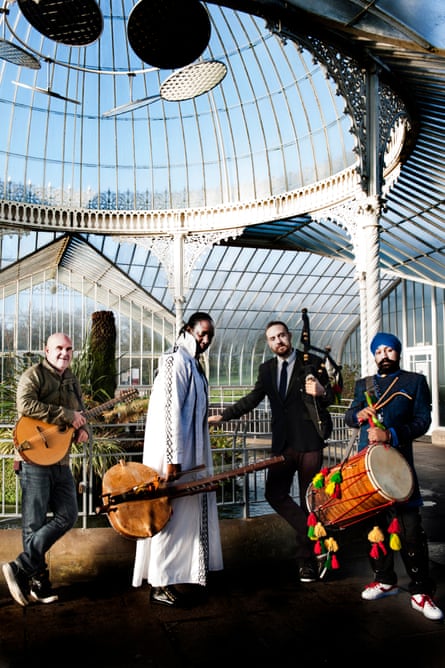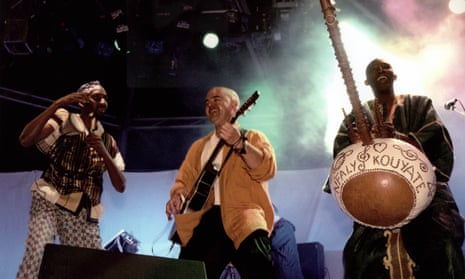The summer of 2022 was a brave and remarkable period for Simon Emmerson, who enlivened the English festival scene by appearing with two celebrated bands, both of which he had co-founded. There were performances by Afro Celt Sound System, joyous veterans of global fusion music, in which electronica is matched against African instruments, the balafon and kora, played by a griot, N’Faly Kouyaté and the pounding Asian dhol drumming of Johnny Kalsi. And there were appearances with the Imagined Village, a band that set out to update traditional English music for a multicultural nation, in which Simon played cittern, joined by a cast that included the sitar player Sheema Mukherjee, singer-songwriter Billy Bragg, and folk stars Martin Carthy, Eliza Carthy and Jackie Oates. He was on impressive form, although he had recently finished a course of chemotherapy.
Simon, who has died aged 67 of cancer, was a musical trailblazer who delighted in exploring the similarities between different genres and bring musicians together. He was a bandleader, composer, multi-instrumentalist, producer and DJ whose interests ranged from rock, jazz, funk, soul and British folk to musical styles from Africa, Latin America and Asia. According to Bragg, who lived near him in Dorset, he was “a visionary leader of projects that inspired many”.
Emmerson had his greatest success with the two bands with whom he made his final appearances. He first had the idea for the Afro Celt Sound System when he was recording in Senegal and noticed the similarities between a West African melody and an Irish air. In 1995 he brought a group of African and Irish traditional musicians together at Peter Gabriel’s Real World studios in Wiltshire. They included the Irish singer Iarla Ó Lionáird and piper Davy Spillane, along with Massamba Diop, the talking drum virtuoso in the band led by the Senegalese musician Baaba Maal. Simon played guitar, added drum and keyboard programming, and produced the resulting album. Sound Magic (1996) was a brave, rousing and unexpected success.

The band went on to become festival and concert hall favourites. After appearing at Womadelaide (the Womad festival in Adelaide) that year, Simon said “those first Australian gigs were the point where we realised the band had very global appeal”.
The lineup changed constantly, with appearances from Sinéad O’Connor on Release (1999) and Robert Plant and Peter Gabriel on Further in Time (2001), both of which won Grammy nominations. After Anatomic (2005) they took a lengthy break from recording, lengthened by a split between founder members of the band. On their 2016 album The Source, the lineup included the Scottish singer piper and rapper Griogair Labhruidh, and there was now less emphasis on electronica. Flight (2018) included a Gaelic lament and an African mass performed by a children’s choir along with the exuberant drumming and beats. The latest album, Ova, has been finished but is yet to be released.
The Imagined Village was a result of Simon being urged to “explore my own roots as a musician” by Baaba Maal, the Clash singer Joe Strummer and the journalist Ian Anderson. Bragg says he discussed “Englishness, politics and birds” with Simon as they walked their dogs together, and Bragg was in the lineup alongside the dub poet Benjamin Zephaniah when the Imagined Village made their debut appearance at the 2007 Womad festival. Their first album, The Imagined Village, was an adventurous if uneven affair, but they became an impressive touring band, appearing on BBC TV’s Later … With Jools Holland, playing a stomping, dhol drum-backed version of the traditional Cold Haily Rainy Night, a song that won best traditional track at the 2008 BBC Folk Awards.
Their second album, Empire and Love (2010), was a massive improvement, with Martin Carthy updating an anti-war song from the Napoleonic wars for the era of Afghanistan and Iraq conflicts, with sitar backing from Mukherjee. After their third album Bending the Dark (2012), the band was put on hold, but recorded a (socially distanced) version of Quiet Joys of Brotherhood during lockdown before their triumphant live return last summer.
Simon was born in London, the son of Alan Emmerson, an architect who had also worked as manager for the rock band Screw, and his wife, Mercia (nee Samson), a sociology lecturer, both members of the Communist party. He attended Ibstock Place primary school and then Wandsworth comprehensive. He attended Forest School Camps, in which his father was heavily involved, and there he developed his love of folk song, nature and bird watching.

He went to Lancaster University, where he was awarded a first in sociology, psychology and philosophy, and then Canterbury, where he studied for a PhD in sociology and philosophy while becoming increasingly involved in music. He played in the punk bands Methodishca Tune and Stepping Talk, and briefly with Scritti Politti, after meeting the band’s leader Green Gartside at a Martin Carthy concert. At the time he was living in a squat in Camden Town, working at Mole Jazz Records and listening to Miles Davis and Stan Getz.
He was still receiving a student grant when he co-founded the jazz-influenced Weekend, so decided to change his professional name. As Simon Booth he played guitar on Weekend’s La Varieté (1982), on which Alison Statton’s bossa-influenced vocals were matched against jazz players including Annie Whitehead on trombone and Larry Stabbins on saxophone. Live at Ronnie Scott’s (1983) featured the jazz pianist Keith Tippett.
Along with Stabbins (and still credited as Booth) he co-founded Working Week, bringing funk and soul into the mix. Their first release Venceremos (1984) was a rousing political track featuring Tracey Thorn and Robert Wyatt on vocals. The singer Julie Roberts joined the band for their album Working Nights (1985), which included a jazz reworking of Marvin Gaye’s classic Inner City Blues. Four albums followed before they split in 1991.
Apart from work with his own bands, Simon’s many production credits included albums for Manu Dibango from Cameroon (Polysonic 1990), Tarika from Madagascar (Son Egal, 1997) and Baaba Maal – he was nominated for a Grammy for Maal’s Firin’ in Fouta (1995). His UK production work included albums for Show of Hands (Witness, 2006) and Spiro (Lightbox, 2009).
Simon co-founded his own record label after a meeting with Mark Constantine, the CEO of the cosmetics firm Lush, who shared his passion for bird-watching. ECC Records (which stood for Emmerson Corncrake Constantine) released albums by both the Afro Celts and Imagined Village. Simon also produced ambient “spa music” sets for Lush, which included samples of birdsong. In 2022 he produced another birdsong fusion to help promote the RSPB’s Big Garden Birdwatch scheme.
He became fascinated by druidry after “an epiphany” while working in Senegal, and after studying under the writer Philip Carr-Gomm was made an honorary bard.
He is survived by his partner Karen Murphy and their children, Ted and Josie, and by his mother and his brother, Paul.

Comments (…)
Sign in or create your Guardian account to join the discussion